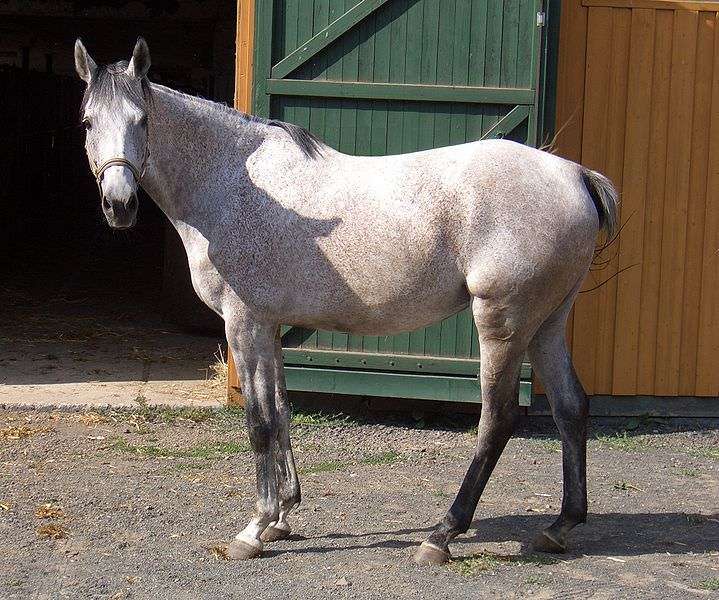They Want to Eat Horses, Don't They?
Slaughtering horses is still a good idea. So why do some continue to oppose it?

In the 1935 novel They Shoot Horses, Don't They? (fixed link), by American author Horace McCoy, a dance marathon set in Southern California amid the desperation of the Great Depression drags on for more than a month. It ends with a set of murders—the latter of which gives rise to the titular question.
These days, another tedious dance has dragged on for even longer. And it, too, centers on an end-of-life question about horses. Can we slaughter them for food?
Last month, the state of New Mexico sued to make sure that wouldn't happen in the state. The state's reasoning is simple.
"We don't eat horses in New Mexico," said New Mexico attorney general Gary King, "and we think this is an inappropriate use of this plant."
The plant in question is an Albuquerque slaughterhouse owned by Valley Meat. The plant has passed all required USDA inspections. It's got the green light to open. And now a succession of opponents of eating horsemeat—including King—have sued to keep it shut. Proposed plants in other states—including Missouri and Iowa—are also under threat.
And that's a shame. In addition to the jobs and tax revenue lost thanks to King's suit and the cost of filling and pursuing the case, a New Mexico law could leave state taxpayers on the hook for nearly $450,000 for each month the plant is shuttered.
But that's just the latest inane consequence of attempts to restrict horse slaughter. The history and terrible consequences of America's recently ended federal ban on horse slaughter is something I've detailed here before.
"The ban was always controversial," I wrote over the summer. "And its terrible unintended consequences were both predictable and predicted."
Those consequences included everything from farmers and ranchers having to ship horses abroad for slaughter to those same farmers and ranchers being forced to set horses free—to roam and eventually starve to death.
If laws forced Americans to continue to raise cattle until the cows died of natural causes, we'd be overrun by starving cattle. If laws permitted those same farmers and ranchers to euthanize cattle, then there'd no doubt be complaints about everything from water quality (all those euthanasia drugs seeping into our water!) to disposal. These sorts of proposals aren't solutions. They're invitations to a host of new problems.
As I noted in my column this past summer, most objective sources—including a widely circulated GAO report—state unequivocally that the failure to slaughter horses is a direct cause of suffering for horses. If slaughtering horses reduces their suffering, then why oppose horse slaughter?
"The GAO report's conclusions relied on the false premise that there was a lack of or an end to the slaughter of U.S. horses at some point," says Keith Dane, vice president of equine protection with the Humane Society for the United States (HSUS), in an email to me earlier this week.
Dane is correct that horses were simply shipped for slaughter to Mexico or Canada—often into allegedly brutal conditions. I think that re-opening domestic slaughterhouses would alleviate these problems.
But Dane tells me that "horse slaughter is inherently inhumane and should be abolished."
Meanwhile, Dane's boss, HSUS president Wayne Pacelle, blogged this week that horse slaughter is "The Dumbest Business Idea Since New Coke."
What makes horse slaughter so unpalatable a business model?
"Taking a step back from the legal wrangles in the state and federal courts," writes Pacelle, whose own group has been at the center of those legal wrangles, "I am amazed that the people behind horse slaughter continue to proceed with their thoroughly unpopular gambit, given the impossibly difficult regulatory and social environment they find themselves in."
Pacelle also likens horse slaughter to whale hunting, and concludes there are "too many practical obstacles—legal, political, and social" to make horse slaughter work. It appears to me to be slightly disingenuous for someone who erects legal barriers to and pushes for a total ban on a business practice to also claim that the business practice can't succeed because it simply faces too many legal obstacles and regulations.
(For the record, I agree wtih HSUS's opposition to so-called "ag gag" laws and called the loss of traction of such laws one of my top five food freedom stories of 2013.)
"The issue of whether horses should be slaughtered for food is highly charged, especially given the reality that the country has an overpopulation of horses," wrote the Santa Fe New Mexican in a recent editorial opposing Valley Meat because, the paper claims, its re-opening would give the state a "black eye" nationally. "Killing the iconic animal for meat might be considered cruel, but so is starving to death."
That's true. But it's also true that this long, drawn-out dance, like the one at the center of McCoy's novel, must end. And I hope that end means horses make their way into America's slaughterhouses, which would leave both horses and people better off.


Show Comments (155)